Supreme Court Case Study: PJ v The Queen - Migration Law Analysis
VerifiedAdded on 2022/09/01
|6
|984
|34
Case Study
AI Summary
This case study analyzes the case of PJ v The Queen, focusing on the application of the Migration Act 1958 concerning people smuggling. The case involves Mr. Jeky Payara, an Indonesian accused of facilitating the smuggling of migrants into Australia. The central issue revolves around the 'fault element' and the requirement to prove the accused's intention to bring the people to Australia. The Supreme Court of Victoria, Court of Appeal, considered the interpretation of section 233C of the Migration Act and the Criminal Code, ultimately acquitting Payara due to the lack of evidence demonstrating his intention. The court emphasized the importance of the accused's intention in the context of aggravated human smuggling. The judgment also touched upon the status of smuggled migrants and the Australian government's response through retrospective legislation like the Deterring People Smuggling Bill 2011. The case study includes legal analysis, statutory interpretations, and relevant case precedents.
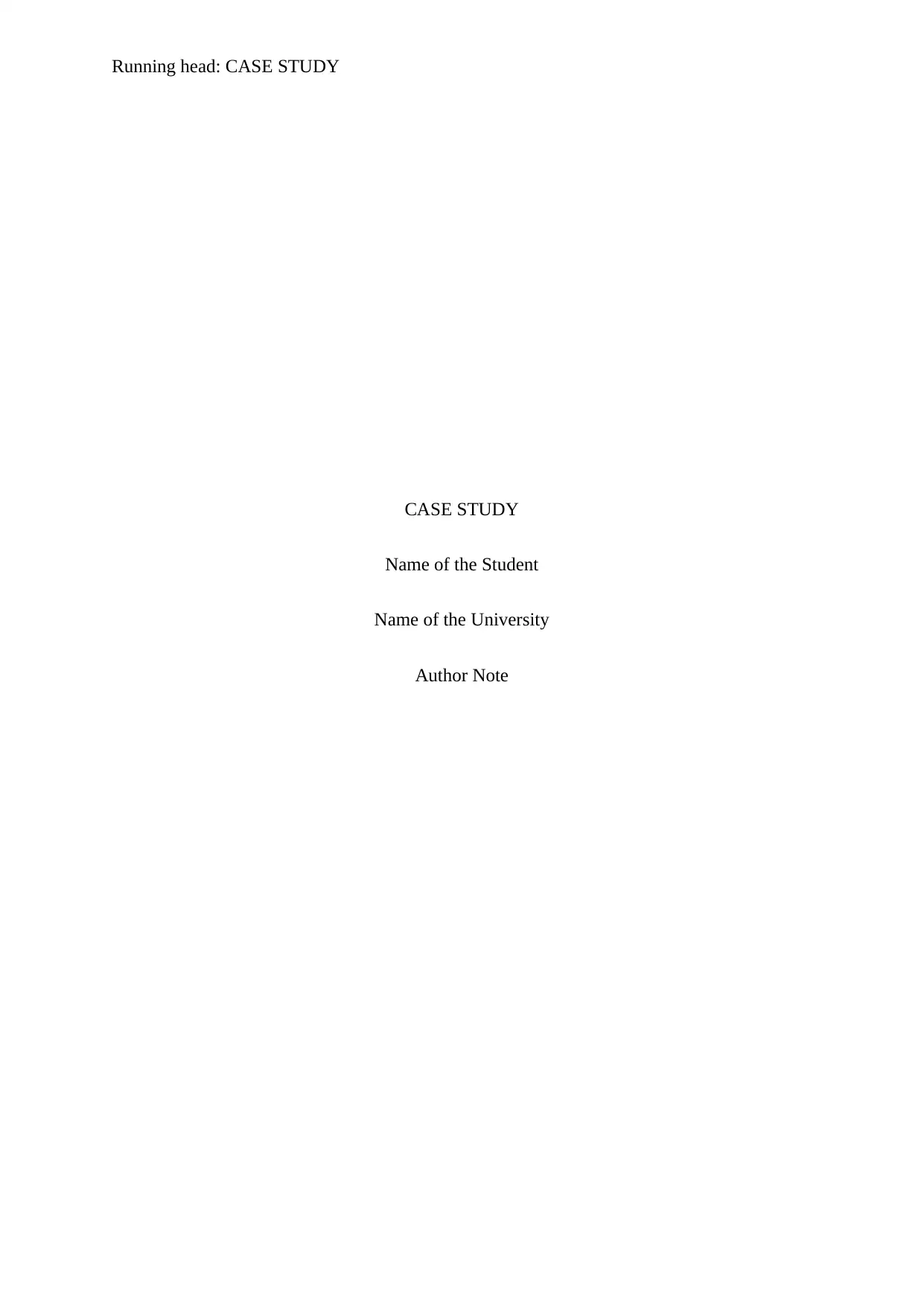
Running head: CASE STUDY
CASE STUDY
Name of the Student
Name of the University
Author Note
CASE STUDY
Name of the Student
Name of the University
Author Note
Paraphrase This Document
Need a fresh take? Get an instant paraphrase of this document with our AI Paraphraser
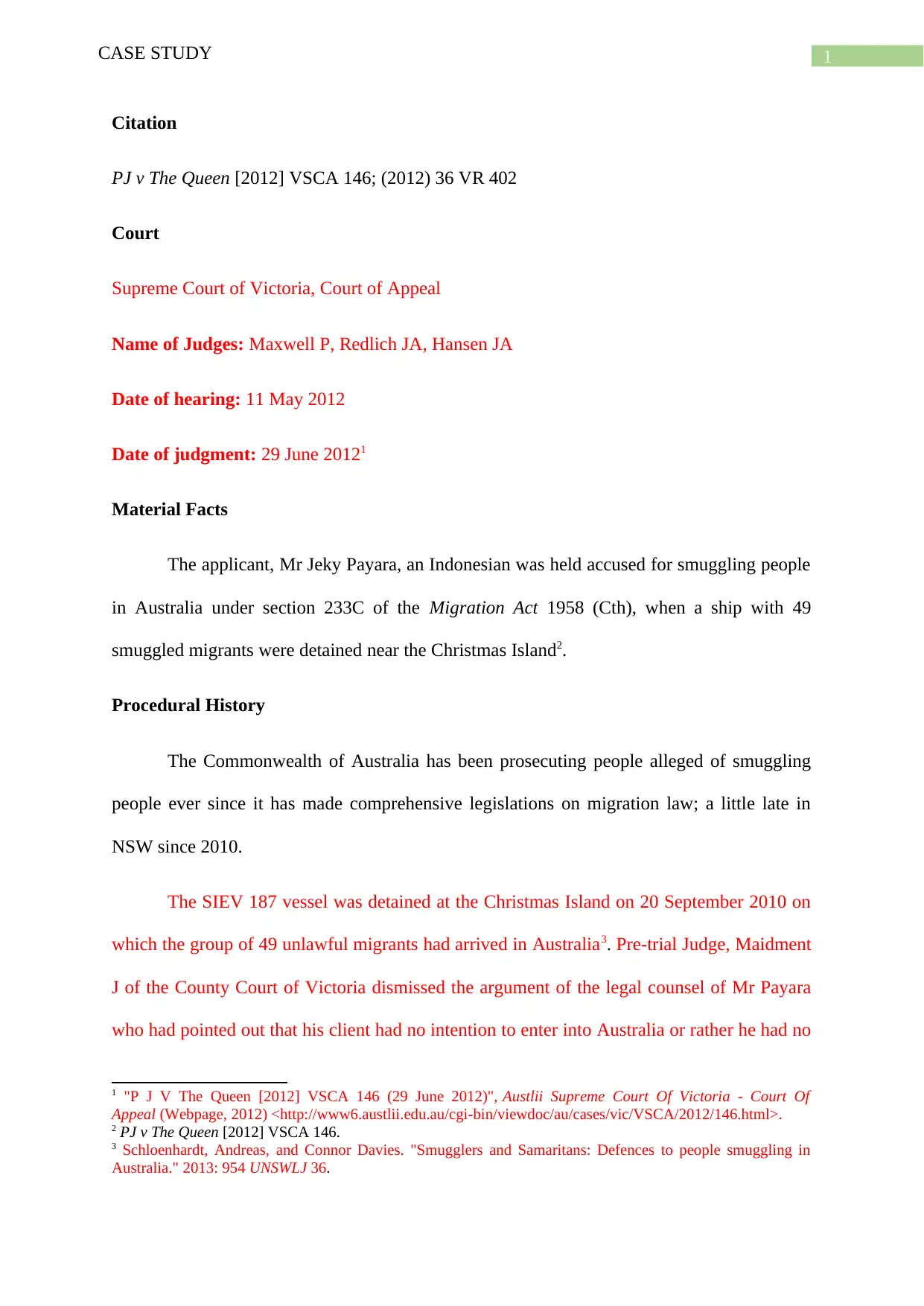
1CASE STUDY
Citation
PJ v The Queen [2012] VSCA 146; (2012) 36 VR 402
Court
Supreme Court of Victoria, Court of Appeal
Name of Judges: Maxwell P, Redlich JA, Hansen JA
Date of hearing: 11 May 2012
Date of judgment: 29 June 20121
Material Facts
The applicant, Mr Jeky Payara, an Indonesian was held accused for smuggling people
in Australia under section 233C of the Migration Act 1958 (Cth), when a ship with 49
smuggled migrants were detained near the Christmas Island2.
Procedural History
The Commonwealth of Australia has been prosecuting people alleged of smuggling
people ever since it has made comprehensive legislations on migration law; a little late in
NSW since 2010.
The SIEV 187 vessel was detained at the Christmas Island on 20 September 2010 on
which the group of 49 unlawful migrants had arrived in Australia3. Pre-trial Judge, Maidment
J of the County Court of Victoria dismissed the argument of the legal counsel of Mr Payara
who had pointed out that his client had no intention to enter into Australia or rather he had no
1 "P J V The Queen [2012] VSCA 146 (29 June 2012)", Austlii Supreme Court Of Victoria - Court Of
Appeal (Webpage, 2012) <http://www6.austlii.edu.au/cgi-bin/viewdoc/au/cases/vic/VSCA/2012/146.html>.
2 PJ v The Queen [2012] VSCA 146.
3 Schloenhardt, Andreas, and Connor Davies. "Smugglers and Samaritans: Defences to people smuggling in
Australia." 2013: 954 UNSWLJ 36.
Citation
PJ v The Queen [2012] VSCA 146; (2012) 36 VR 402
Court
Supreme Court of Victoria, Court of Appeal
Name of Judges: Maxwell P, Redlich JA, Hansen JA
Date of hearing: 11 May 2012
Date of judgment: 29 June 20121
Material Facts
The applicant, Mr Jeky Payara, an Indonesian was held accused for smuggling people
in Australia under section 233C of the Migration Act 1958 (Cth), when a ship with 49
smuggled migrants were detained near the Christmas Island2.
Procedural History
The Commonwealth of Australia has been prosecuting people alleged of smuggling
people ever since it has made comprehensive legislations on migration law; a little late in
NSW since 2010.
The SIEV 187 vessel was detained at the Christmas Island on 20 September 2010 on
which the group of 49 unlawful migrants had arrived in Australia3. Pre-trial Judge, Maidment
J of the County Court of Victoria dismissed the argument of the legal counsel of Mr Payara
who had pointed out that his client had no intention to enter into Australia or rather he had no
1 "P J V The Queen [2012] VSCA 146 (29 June 2012)", Austlii Supreme Court Of Victoria - Court Of
Appeal (Webpage, 2012) <http://www6.austlii.edu.au/cgi-bin/viewdoc/au/cases/vic/VSCA/2012/146.html>.
2 PJ v The Queen [2012] VSCA 146.
3 Schloenhardt, Andreas, and Connor Davies. "Smugglers and Samaritans: Defences to people smuggling in
Australia." 2013: 954 UNSWLJ 36.
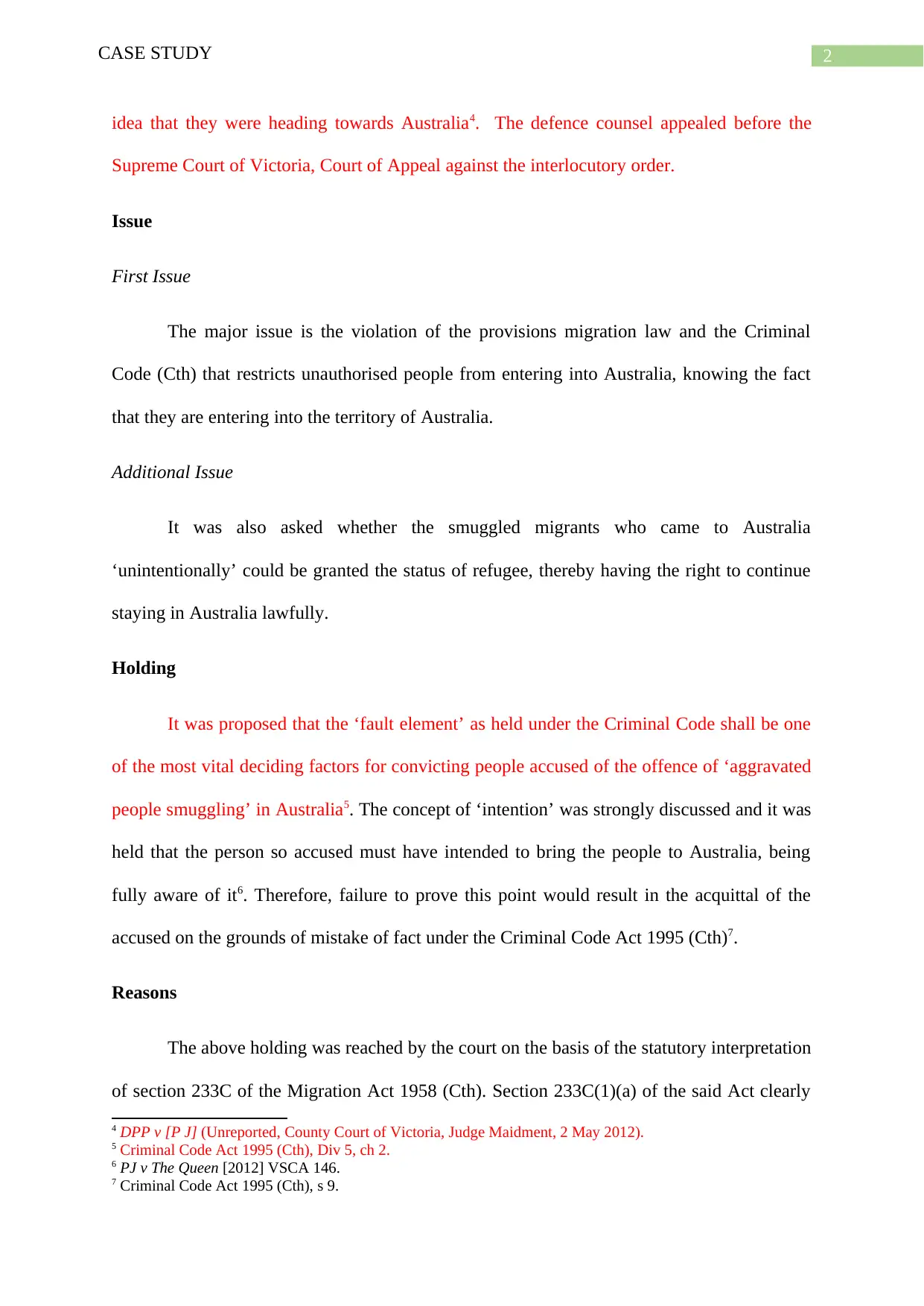
2CASE STUDY
idea that they were heading towards Australia4. The defence counsel appealed before the
Supreme Court of Victoria, Court of Appeal against the interlocutory order.
Issue
First Issue
The major issue is the violation of the provisions migration law and the Criminal
Code (Cth) that restricts unauthorised people from entering into Australia, knowing the fact
that they are entering into the territory of Australia.
Additional Issue
It was also asked whether the smuggled migrants who came to Australia
‘unintentionally’ could be granted the status of refugee, thereby having the right to continue
staying in Australia lawfully.
Holding
It was proposed that the ‘fault element’ as held under the Criminal Code shall be one
of the most vital deciding factors for convicting people accused of the offence of ‘aggravated
people smuggling’ in Australia5. The concept of ‘intention’ was strongly discussed and it was
held that the person so accused must have intended to bring the people to Australia, being
fully aware of it6. Therefore, failure to prove this point would result in the acquittal of the
accused on the grounds of mistake of fact under the Criminal Code Act 1995 (Cth)7.
Reasons
The above holding was reached by the court on the basis of the statutory interpretation
of section 233C of the Migration Act 1958 (Cth). Section 233C(1)(a) of the said Act clearly
4 DPP v [P J] (Unreported, County Court of Victoria, Judge Maidment, 2 May 2012).
5 Criminal Code Act 1995 (Cth), Div 5, ch 2.
6 PJ v The Queen [2012] VSCA 146.
7 Criminal Code Act 1995 (Cth), s 9.
idea that they were heading towards Australia4. The defence counsel appealed before the
Supreme Court of Victoria, Court of Appeal against the interlocutory order.
Issue
First Issue
The major issue is the violation of the provisions migration law and the Criminal
Code (Cth) that restricts unauthorised people from entering into Australia, knowing the fact
that they are entering into the territory of Australia.
Additional Issue
It was also asked whether the smuggled migrants who came to Australia
‘unintentionally’ could be granted the status of refugee, thereby having the right to continue
staying in Australia lawfully.
Holding
It was proposed that the ‘fault element’ as held under the Criminal Code shall be one
of the most vital deciding factors for convicting people accused of the offence of ‘aggravated
people smuggling’ in Australia5. The concept of ‘intention’ was strongly discussed and it was
held that the person so accused must have intended to bring the people to Australia, being
fully aware of it6. Therefore, failure to prove this point would result in the acquittal of the
accused on the grounds of mistake of fact under the Criminal Code Act 1995 (Cth)7.
Reasons
The above holding was reached by the court on the basis of the statutory interpretation
of section 233C of the Migration Act 1958 (Cth). Section 233C(1)(a) of the said Act clearly
4 DPP v [P J] (Unreported, County Court of Victoria, Judge Maidment, 2 May 2012).
5 Criminal Code Act 1995 (Cth), Div 5, ch 2.
6 PJ v The Queen [2012] VSCA 146.
7 Criminal Code Act 1995 (Cth), s 9.
⊘ This is a preview!⊘
Do you want full access?
Subscribe today to unlock all pages.

Trusted by 1+ million students worldwide
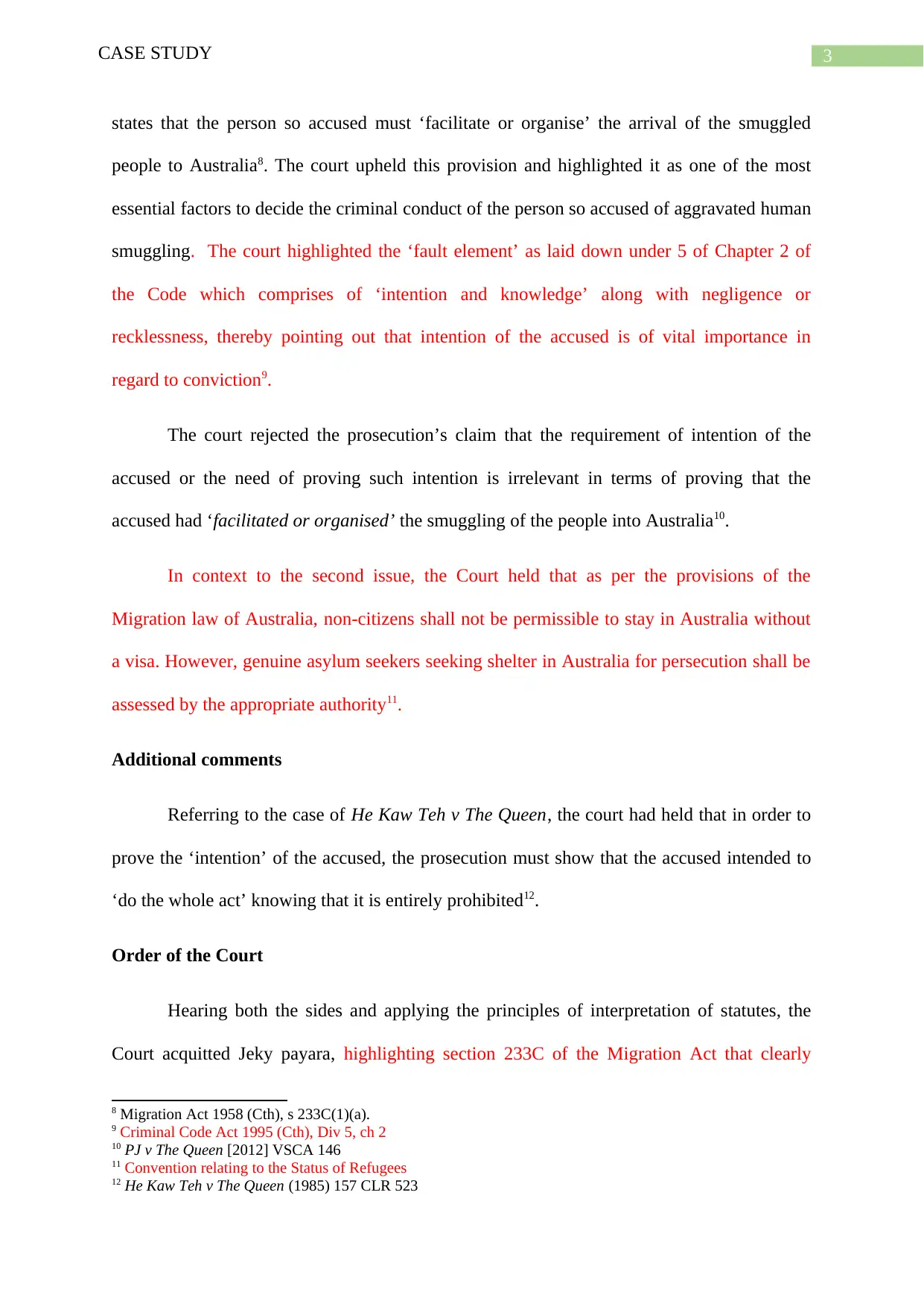
3CASE STUDY
states that the person so accused must ‘facilitate or organise’ the arrival of the smuggled
people to Australia8. The court upheld this provision and highlighted it as one of the most
essential factors to decide the criminal conduct of the person so accused of aggravated human
smuggling. The court highlighted the ‘fault element’ as laid down under 5 of Chapter 2 of
the Code which comprises of ‘intention and knowledge’ along with negligence or
recklessness, thereby pointing out that intention of the accused is of vital importance in
regard to conviction9.
The court rejected the prosecution’s claim that the requirement of intention of the
accused or the need of proving such intention is irrelevant in terms of proving that the
accused had ‘facilitated or organised’ the smuggling of the people into Australia10.
In context to the second issue, the Court held that as per the provisions of the
Migration law of Australia, non-citizens shall not be permissible to stay in Australia without
a visa. However, genuine asylum seekers seeking shelter in Australia for persecution shall be
assessed by the appropriate authority11.
Additional comments
Referring to the case of He Kaw Teh v The Queen, the court had held that in order to
prove the ‘intention’ of the accused, the prosecution must show that the accused intended to
‘do the whole act’ knowing that it is entirely prohibited12.
Order of the Court
Hearing both the sides and applying the principles of interpretation of statutes, the
Court acquitted Jeky payara, highlighting section 233C of the Migration Act that clearly
8 Migration Act 1958 (Cth), s 233C(1)(a).
9 Criminal Code Act 1995 (Cth), Div 5, ch 2
10 PJ v The Queen [2012] VSCA 146
11 Convention relating to the Status of Refugees
12 He Kaw Teh v The Queen (1985) 157 CLR 523
states that the person so accused must ‘facilitate or organise’ the arrival of the smuggled
people to Australia8. The court upheld this provision and highlighted it as one of the most
essential factors to decide the criminal conduct of the person so accused of aggravated human
smuggling. The court highlighted the ‘fault element’ as laid down under 5 of Chapter 2 of
the Code which comprises of ‘intention and knowledge’ along with negligence or
recklessness, thereby pointing out that intention of the accused is of vital importance in
regard to conviction9.
The court rejected the prosecution’s claim that the requirement of intention of the
accused or the need of proving such intention is irrelevant in terms of proving that the
accused had ‘facilitated or organised’ the smuggling of the people into Australia10.
In context to the second issue, the Court held that as per the provisions of the
Migration law of Australia, non-citizens shall not be permissible to stay in Australia without
a visa. However, genuine asylum seekers seeking shelter in Australia for persecution shall be
assessed by the appropriate authority11.
Additional comments
Referring to the case of He Kaw Teh v The Queen, the court had held that in order to
prove the ‘intention’ of the accused, the prosecution must show that the accused intended to
‘do the whole act’ knowing that it is entirely prohibited12.
Order of the Court
Hearing both the sides and applying the principles of interpretation of statutes, the
Court acquitted Jeky payara, highlighting section 233C of the Migration Act that clearly
8 Migration Act 1958 (Cth), s 233C(1)(a).
9 Criminal Code Act 1995 (Cth), Div 5, ch 2
10 PJ v The Queen [2012] VSCA 146
11 Convention relating to the Status of Refugees
12 He Kaw Teh v The Queen (1985) 157 CLR 523
Paraphrase This Document
Need a fresh take? Get an instant paraphrase of this document with our AI Paraphraser
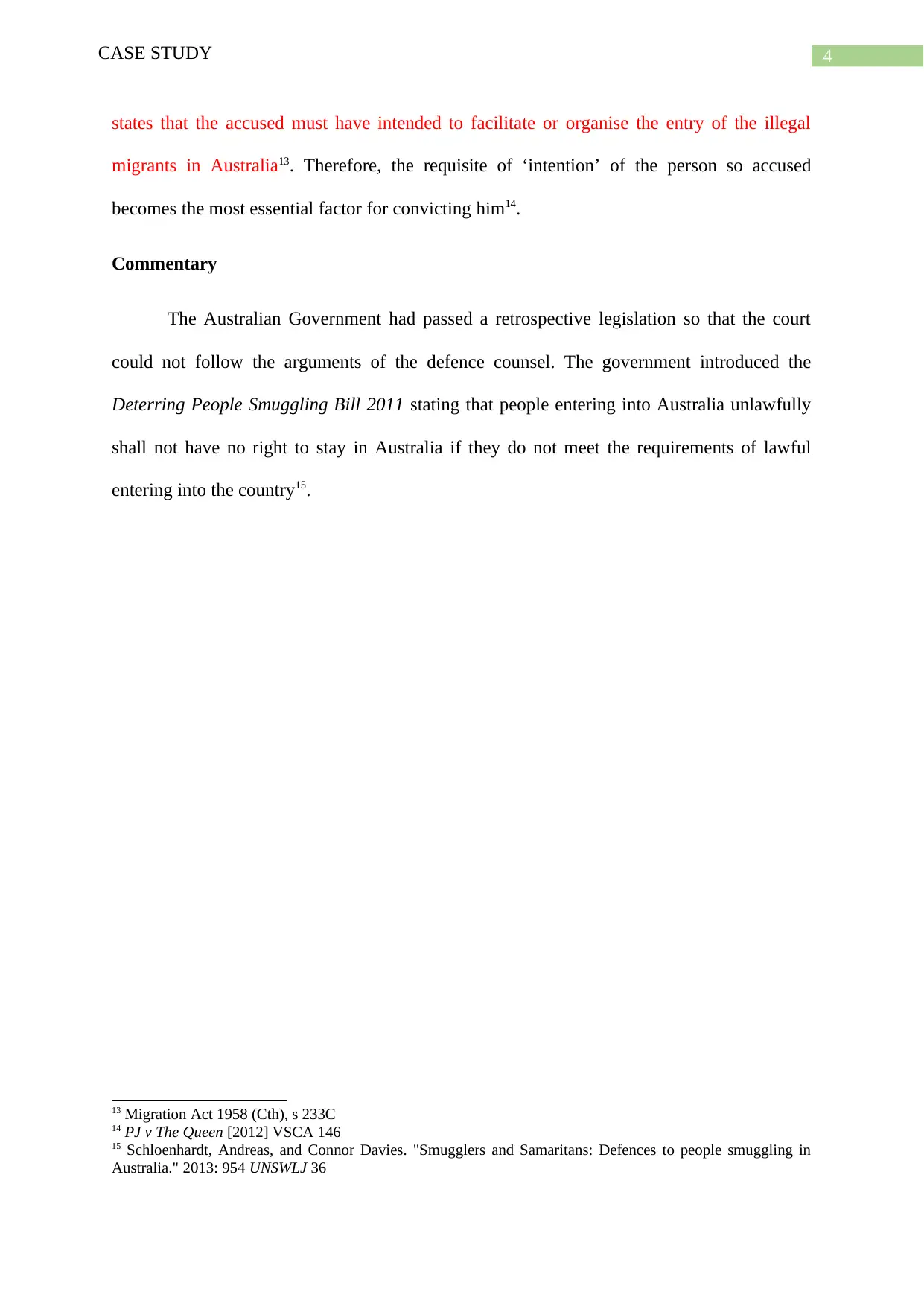
4CASE STUDY
states that the accused must have intended to facilitate or organise the entry of the illegal
migrants in Australia13. Therefore, the requisite of ‘intention’ of the person so accused
becomes the most essential factor for convicting him14.
Commentary
The Australian Government had passed a retrospective legislation so that the court
could not follow the arguments of the defence counsel. The government introduced the
Deterring People Smuggling Bill 2011 stating that people entering into Australia unlawfully
shall not have no right to stay in Australia if they do not meet the requirements of lawful
entering into the country15.
13 Migration Act 1958 (Cth), s 233C
14 PJ v The Queen [2012] VSCA 146
15 Schloenhardt, Andreas, and Connor Davies. "Smugglers and Samaritans: Defences to people smuggling in
Australia." 2013: 954 UNSWLJ 36
states that the accused must have intended to facilitate or organise the entry of the illegal
migrants in Australia13. Therefore, the requisite of ‘intention’ of the person so accused
becomes the most essential factor for convicting him14.
Commentary
The Australian Government had passed a retrospective legislation so that the court
could not follow the arguments of the defence counsel. The government introduced the
Deterring People Smuggling Bill 2011 stating that people entering into Australia unlawfully
shall not have no right to stay in Australia if they do not meet the requirements of lawful
entering into the country15.
13 Migration Act 1958 (Cth), s 233C
14 PJ v The Queen [2012] VSCA 146
15 Schloenhardt, Andreas, and Connor Davies. "Smugglers and Samaritans: Defences to people smuggling in
Australia." 2013: 954 UNSWLJ 36
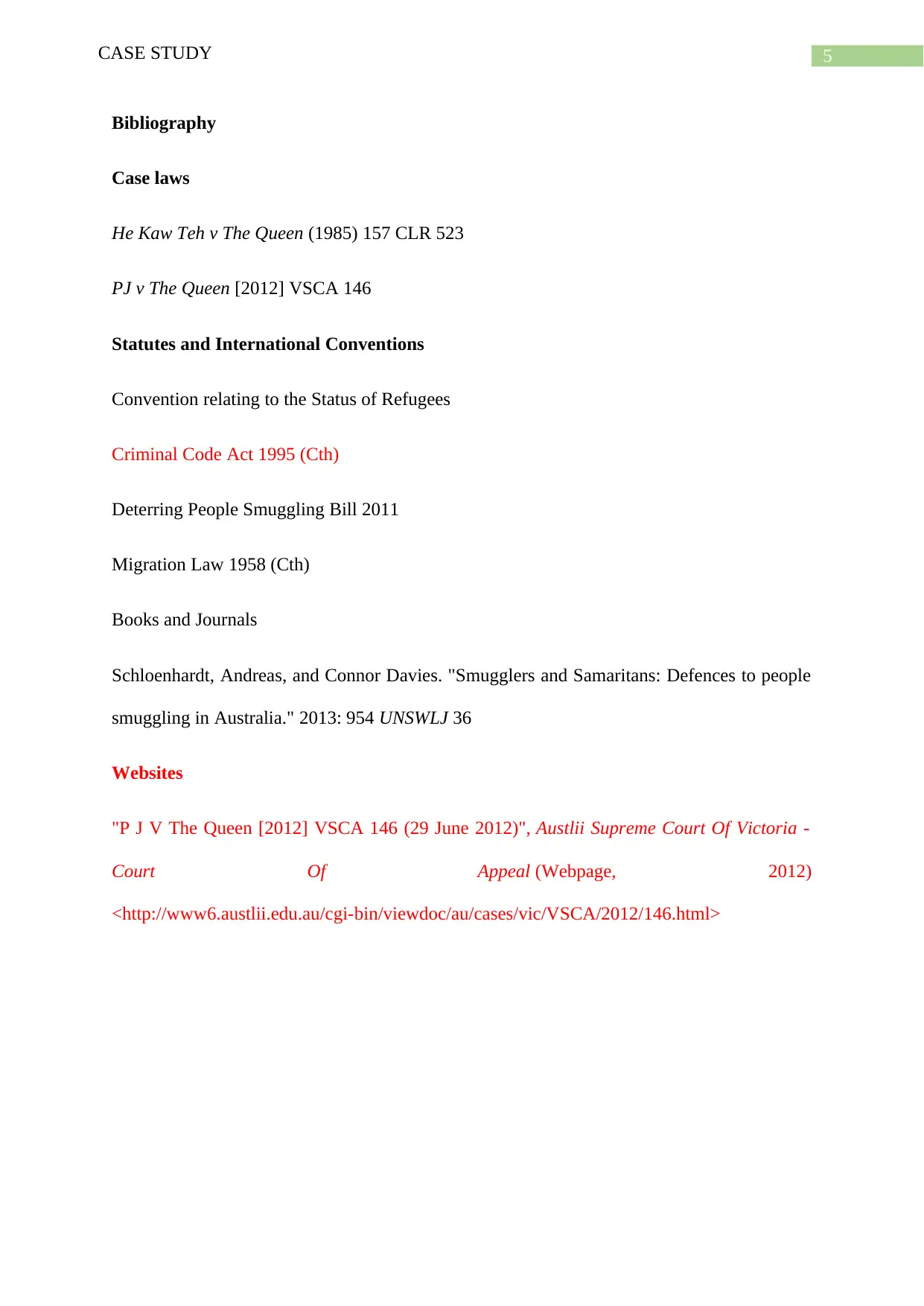
5CASE STUDY
Bibliography
Case laws
He Kaw Teh v The Queen (1985) 157 CLR 523
PJ v The Queen [2012] VSCA 146
Statutes and International Conventions
Convention relating to the Status of Refugees
Criminal Code Act 1995 (Cth)
Deterring People Smuggling Bill 2011
Migration Law 1958 (Cth)
Books and Journals
Schloenhardt, Andreas, and Connor Davies. "Smugglers and Samaritans: Defences to people
smuggling in Australia." 2013: 954 UNSWLJ 36
Websites
"P J V The Queen [2012] VSCA 146 (29 June 2012)", Austlii Supreme Court Of Victoria -
Court Of Appeal (Webpage, 2012)
<http://www6.austlii.edu.au/cgi-bin/viewdoc/au/cases/vic/VSCA/2012/146.html>
Bibliography
Case laws
He Kaw Teh v The Queen (1985) 157 CLR 523
PJ v The Queen [2012] VSCA 146
Statutes and International Conventions
Convention relating to the Status of Refugees
Criminal Code Act 1995 (Cth)
Deterring People Smuggling Bill 2011
Migration Law 1958 (Cth)
Books and Journals
Schloenhardt, Andreas, and Connor Davies. "Smugglers and Samaritans: Defences to people
smuggling in Australia." 2013: 954 UNSWLJ 36
Websites
"P J V The Queen [2012] VSCA 146 (29 June 2012)", Austlii Supreme Court Of Victoria -
Court Of Appeal (Webpage, 2012)
<http://www6.austlii.edu.au/cgi-bin/viewdoc/au/cases/vic/VSCA/2012/146.html>
⊘ This is a preview!⊘
Do you want full access?
Subscribe today to unlock all pages.

Trusted by 1+ million students worldwide
1 out of 6
Your All-in-One AI-Powered Toolkit for Academic Success.
+13062052269
info@desklib.com
Available 24*7 on WhatsApp / Email
![[object Object]](/_next/static/media/star-bottom.7253800d.svg)
Unlock your academic potential
Copyright © 2020–2026 A2Z Services. All Rights Reserved. Developed and managed by ZUCOL.

![Corporate/Business Law Case Study: Dietrich v The Queen [1992] HCA 57](/_next/image/?url=https%3A%2F%2Fdesklib.com%2Fmedia%2Fimages%2Flx%2Ff768e4f024df43f589cc337774c884e1.jpg&w=256&q=75)